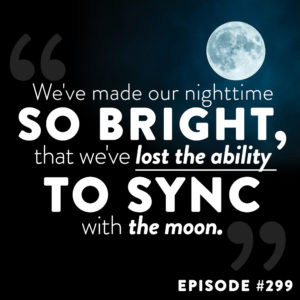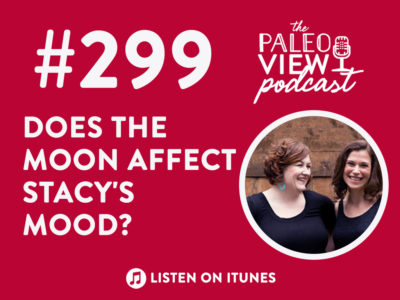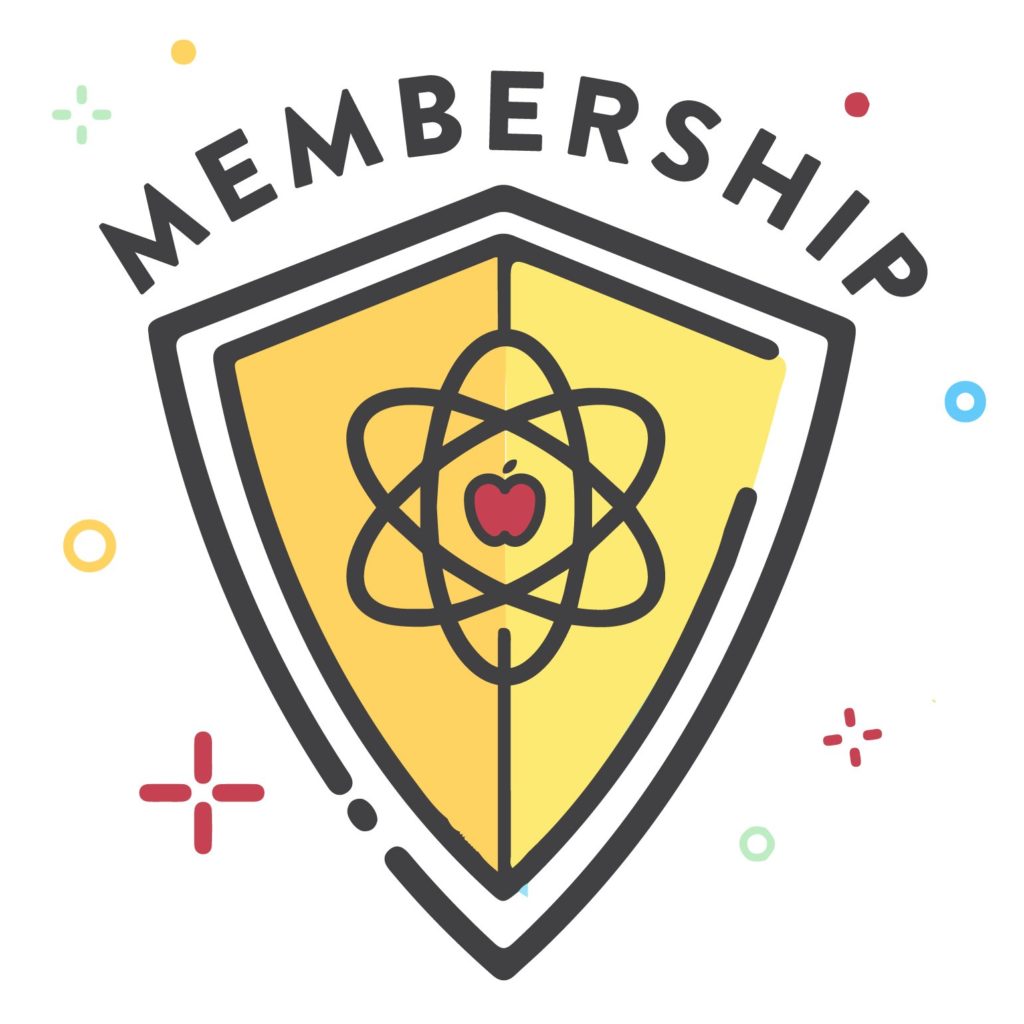In this episode, Stacy is convinced that her body and hormones are affected by the moon. What will Sarah say?
Click here to listen in iTunes
or download and listen by clicking the PodBean Player below
![]()
If you enjoy the show, please review it in iTunes!
The Paleo View (TPV), Episode 299: Does the Moon Affect Stacy’s Mood?
- Intro (0:00)
- News and Views (0:40)
- Stacy was at a Beautycounter conference this past weekend.
- While the conference itself was great, the part that was amazing was meeting some incredible women in person that she’s been working with for over a year.
- Stacy minored in women’s studies, so helping a team of women to succeed an achieve their goals has been a long-time dream come true for her.
- While she is successful at her day job and enjoys it, it never directly empowered women for a greater cause, which is what her work with Beautycounter has helped her to do.
- Stacy was bawling all weekend, realizing she was part of something bigger and had helped other women find their power and their voice, and was part of a mission that matters.
- Stacy was at a Beautycounter conference this past weekend.
- Stacy’s Burning Question for Sarah (8:01)
- Stacy has been feeling very connected and affected by lunar cycles, which is a weird thing for her to say out loud. After some research, she found information supporting a link to mood and hormones. Lunar cycles are known to affect bodies of water (ie: the tides) and humans are made up of mostly water- so Stacy wants to know, what does the science say related to how the moon affects humans?
- There has been a lot of interest in the circalunar cycle, especially in the last 5-10 years.
- We have a circadian rhythm, which keeps track of our 24 hours in the day.
- It syncs our brain with the “clock” that is in every one of our cells.
- There is seasonal variation as well- changes in physiology based on the season.
- We don’t really fully understand circalunar rhythms.
- These cycles are much stronger in marine animals.
- There are observations based on rhythm on a 29.5-day cycle.
- Spawning, gonad growth, reproductive cycles, etc.
- Research is starting to identify some genetic components to these circalunar cycles.
- It is analogous to our circadian rhythms- outside stimulus that influences internal factors.
- There is a good scientific foundation of mechanism and molecular mechanics of the circalunar rhythms.
- There are behaviors and physiology changes in humans that have been linked to the moon.
- The old saying “must be a full moon.”
- There have been some rigorous studies looking at things like birth rate and fertility and phases of the moon.
- These two things have not been found to be correlated in the science.
- There are studies in schizophrenia showing a small increase of violence or aggressive episodes during a full moon.
- There is also a possible correlation between seizures when thy sky is brighter, not necessarily when the moon is full though.
- A study done in 2013 looked at the lunar cycle and sleep quality.
- It showed more deep sleep during the full moon.
- A study that tried to replicate the data didn’t get the same results.
- It is not tidal effects on humans, as we are an incredibly small amount of water.
- Tides in the ocean, versus tides in some of the largest lakes in the world.
- Lake Superior’s tide change due to the moon is about 3cm.
- Humans are a ridiculously small amount of water compared to this.
- Lake Superior’s tide change due to the moon is about 3cm.
- Tides in the ocean, versus tides in some of the largest lakes in the world.
- It could have to do with the amount of light at night being greater during a full moon.
- We tend not to evolve useless things.
- Our photoreceptors could be good multi-taskers as well.
- We have completely messed up how our body detects moon light, and messed up our circadian rhythms by having lights on at night, spending too much time inside, screen time, etc.
- Indoor lights is a large disruptor of sleep.
- The bright sun is between 400-130,000 lux.
- The full moon is 0.25 lux, and half moon is 0.025 lux, starlight is 0.0001 lux.
- We’re supposed to have a very dim light signal in the evenings.
- Indoor lighting is between 200-300 lux.
- Street lights or heavy traffic is about 75 lux.
- Smartphone and tablet screens are 30-50 lux.
- There are so many sources of light that we are never in a nighttime environment.
- We don’t have the ability to sync with the moon anymore.
- We’ve probably destroyed our ability to study circalunar rhythms in humans.
- We’re supposed to have a very dim light signal in the evenings.
- We tend not to evolve useless things.
- When we do learn more about circalunar cycles, it is unclear how that would inform what we can do in our modern lives to make up for it.
- Right now we can eat a nutrient-focuses diet, have a rigid bedtime, spend time outside, take activity breaks during the day, use a treadmill desk, nurture in-person relationships, etc.
- It is challenging to get rid of nighttime light and is unclear what impact it would have on our health.
- Ultimately, Sarah is saying that there is evidence that circalunar cycles are a real thing, but they are driven by nighttime light, not tidal forces.
- Stacy still believes that the moon makes her super emotional!
- We as a population have a strong cultural bond to the full moon, which can be a driving force.
- Stacy still believes that the moon makes her super emotional!
- The moon is actually getting farther away from us- the light at night and tidal forces used to be stronger.
- It could have had a bigger impact back in this time.
- The most hope for understanding a link between human physiology and human behavior and the lunar cycle is not in big population studies but in a basic understanding the mechanism of circalunar cycles in sea urchins and corals, and then trying to identifying if those pathways were preserved in mammals.
- Stacy is not putting this to rest yet- she’s going to be on lunar-watch!
- Listeners, Stacy needs your emotional support!
- Please comment and share your particular superstitions with us!
- We love when you leave us comments, or reviews if you’d enjoyed the show.
- Stacy has been feeling very connected and affected by lunar cycles, which is a weird thing for her to say out loud. After some research, she found information supporting a link to mood and hormones. Lunar cycles are known to affect bodies of water (ie: the tides) and humans are made up of mostly water- so Stacy wants to know, what does the science say related to how the moon affects humans?
- If you’ve enjoyed the show, please recommend it to someone who might enjoy it.
- We love when you share and when you leave reviews for us! Thanks for listening!





 Paleo for Pregnancy and Lactation
Paleo for Pregnancy and Lactation